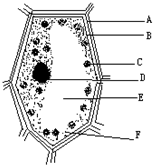如图是一个细胞的结构图,看图回答下列问题(“〔〕”内填字母,“-”上填文字):
(1)这是一个______(选填“植物”或“动物”)细胞,其依据是细胞中有〔A〕______;〔E〕______;〔C〕______.
(2)水稻苗吸收含硅的无机盐,而吸收含钙的无机盐少,是因为细胞具有〔B〕______的缘故.
(3)切西瓜时,流出的汁水是______,主要来自图中的〔E〕______.
(4)含有遗传物质的结构是______.
(5)细胞分裂时,首先是图中〔D〕______分裂成两个.
(6)______和______都是细胞中的能量转换器.

(1)观图可知:A是细胞壁;B是细胞膜;C是叶绿体;D是细胞核;E是液泡;F是细胞质;此细胞有细胞壁、液泡和叶绿体,所以是植物细胞;
(2)细胞膜紧贴在细胞壁的内面,能控制物质进出,让对细胞有用的物质不能通过细胞膜出来,有害的物质也不能进入细胞;
(3)切西瓜时,流出来的汁液主要来自液泡中的细胞液,其内含有大量的水分、糖类物质及色素等;
(4)细胞核一般位于细胞的中央,里面有遗传物质;
(5)细胞分裂就是一个细胞分成两个细胞,分裂时细胞核先分成两个,随后细胞质分成两份,每份各含一个细胞核,最后动物细胞的细胞膜从中央向内凹陷,将原细胞缢裂为两个细胞;植物细胞在原来细胞的中央,形成新的细胞膜和细胞壁;
(6)细胞中的能量转换器有叶绿体和线粒体.叶绿体中的叶绿素能吸收光能,将光能转变为化学能,储存在它所制造的有机物中;线粒体能将细胞中的有机物在氧的参与下分解为二氧化碳和水,同时将有机物中的化学能释放出来,供细胞利用.动物是异养的,其细胞内不含能够进行光合作用的叶绿体,只有线粒体.绿色植物的细胞内含有两种能量转换器:叶绿体和线粒体
故答案为:(1)植物;细胞壁;液泡;叶绿体;(2)细胞膜;(3)细胞液;液泡;(4)细胞核;(5)细胞核;(6)叶绿体;线粒体.
